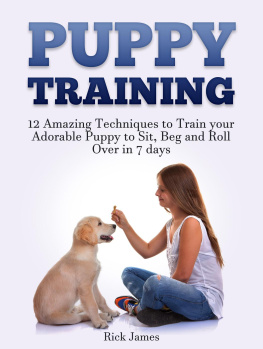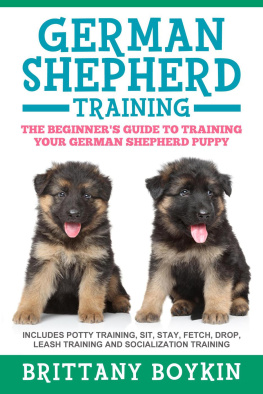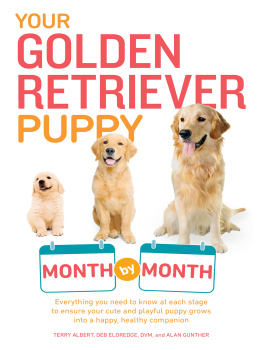Table of Contents
Introduction
Before Buying a Dog or Puppy
Overview
Commands
Training Equipment
Getting Puppy Used to a Leash
Going to the Bathroom...
Paper Training
Dealing with Accidents
Teaching Puppy his Name
Crate Training
Good Behavior
The Sit Command
The Down Command
The Stand Command
The Come Command
Walking on a Leash
Using the Clicker
The Take Command
The Settle Command
The Off Command
The Off Command pt.2
The Give Command
The Stay Command
The Heel Command
The Wait Command
Consistency of Training
Advanced Tricks
The Fetch Trick
The Shake Hands Tricks
The Sit Pretty Command
The Crawl Command
The Roll Over Trick
The High Five Trick
The Drop It! Command
The Bow Command
The Beg Trick
The Play Dead Trick
The Kiss Trick
The Speak Trick
The Peekaboo Trick
The Target Trick
The Act Scared Trick
The Alarm Trick
The Wake Up Trick
Hide and Seek
Go to Sleep
The Dance Trick
The Ring the Bell Trick
The Paws Up Trick
The Pray Trick
The Circle Trick
The Wave Trick
Curbing Problem Behavior
Jumping Up on People
Jumping on Furniture
Barking
Begging
Chewing
Separation Anxiety
Chasing People of Cars
Introduction
Teaching your dog tricks is not only terrific fun (for both you and your dog) but can also help your dog become a better pet, as well as possibly even save his life! With this application, youll be able to teach your dog several helpful basic commands as well as some great tricks he cant wait to show off!
This book is perfect for both new dog owners and people who have owned a dog before. If this is your first time training a dog, we have a special section devoted to puppy care including housebreaking, leash training, crate training and other must know puppy information. Theres also a section on corrective behavior which shows you how to train your dog against unwanted behavior such as chewing, chasing and getting up on furniture. You dont need any special training, requirements or know-how to train your dog. Just positive encouragement, patience and a little time each day are all thats required!

Enjoy and good luck!
Before Buying a Dog or Puppy
If you're buying a dog or puppy - from a pet store, someone you know or the shelter, it's important to ask a few good questions. Don't rush into buying a dog before you know a little about its background. If you buy your dog from a breeder, be sure to ask the breeder:
- About the history of the dog breed. What were they originally bred to do? (Some dogs are "working" dogs, some are "herding" dogs, and so on. Knowing the history of the breed will help you select the right kind of dog that fits your personality well - which makes training that much easier and fun for both of you!
- How long has the breeder been in business? Many breeders can tell you about the history of both of the dog's parents or show them to you so that you'll know the dog or puppy came from a healthy background.
- If you can see the other dogs they keep. Most breeders have several dogs on the grounds. Be sure to ask if you can see them to make sure they look healthy, lively and active. Watch for signs of illness or dogs/puppies that are disturbed or seem incredibly tired/malaise as these are serious warning signs of an unhealthy environment.
- When the dogs/puppies had their shots. Newborn puppies must have basic shots and de-worming medicine generally before they can be sold, or very soon thereafter to avoid illness.
- About the dog's health. Be sure to check their eyes or nose for any kind of drainage, check their ears for redness and see if the dog seems healthy and excited overall to see you.
- For references. Good breeders will be brimming with testimonials from other owners who bought their dogs there. Be sure to call these people and ask about their experience. How is their dog doing now? Did they have any kind of problems after they brought the puppy home? If you buy your dog from a pet store:
- Research the history and background of the store. You can search online for pet store reviews in your local area. - Some pet stores get their dogs or puppies from puppy mills, which are cruel, inhumane conditions where dogs are simply bred to the point of exhaustion. Dogs from puppy mills do not often live long because of the unsanitary conditions there.
- Ask about the store's guarantees for the dog. What kind of guarantees do they offer if something happens to the dog?
If you buy your dog from a shelter:
- Ask the staff how the dog ended up at the shelter. Many perfectly good and healthy dogs are turned in because their owners are moving and/or have developed allergies.
- See if you can find out how old the dog is (approximately). Did the vet check the dog's health? Is there anything you should know about him?
- Did the dog/puppy get all their needed shots? When is the next time they will need shots or a checkup?
- Are there any signs of aggression? Many dogs hate being cooped up in cages, so may be aggressive or wary of visitors at first or feel uncomfortable around other dogs - particularly if they were just brought to the shelter recently. This is a normal reaction at first.
- Ask if you can spend some time alone with the dog when it is out of its cage. See how it reacts to being around you. Ask about how the dog seems to act around children or other pets if you have any.
If you get your dog from a friend or neighbor:
- Ask if the dog is theirs, or if it came from someone else or was a stray.
- Ask about the dog's health. When was its last vet checkup? - Does the dog have all his shots? When are the next ones due?
- Spend some time alone with the dog to see how it reacts to being around you. In every case, no matter what you're told about the dog's health, shots or general well-being, it's a good idea to take the dog to a vet right away for a checkup. Some animal shelters will include this when you buy a puppy or dog from them. 
If youre buying a dog or puppy its important to ask a few good questions.
Overview
Teaching your dog tricks doesn't need to be frustrating or difficult. Even if you don't have any prior dog training experience or have never owned a dog before, anyone can teach their dog and any dog is teachable.
Teaching your dog a fun trick is a rewarding and bonding experience for both of you that will only bring you closer. The following tricks are made especially for beginning trainers and their dogs. These tricks are also good for puppies to learn too.
When training your dog for the first time, you'll want to keep a few tips in mind before you get started:
1) Each dog learns at a different level and in a different style, just like people do. If you've owned a dog before, your new dog may not respond as quickly or may respond even quicker to training than the old dog. Don't get frustrated at yourself or your pet, and don't give up!
2) It make take several tries to get a trick just right, and your dog may need a break between training sessions to "take it all in". Don't forget to review previous tricks to give your dog a refresher course on something new he's just learned.
3) Above all, avoid skipping from one trick to the next in case your dog doesn't "get it". With practice, praise and repetition, any dog can learn.
Next page












